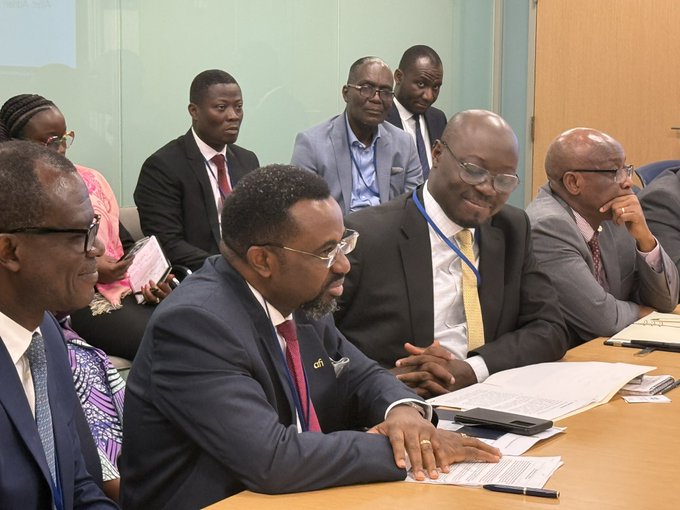NPP, Bawumia Sing Different Tunes as Mahama Gov’t Hails Miracle Performance
By Gifty BoatengA seismic shift in Ghana’s economic landscape has thrown the opposition New Patriotic Party (NPP) into disarray, as the Ghana Cedi continues its impressive surge against the US Dollar and other currencies.
The surprising performance, a stark contrast to the NPP’s eight-year tenure, has left party bigwigs, including former Vice President Dr. Mahamudu Bawumia, scrambling to offer explanations, often contradicting each other.
For years, Dr. Bawumia was lauded as the NPP’s economic “wizkid,” yet his administration never achieved the currency stability now witnessed under the Dr. Ato Forson and Dr. Johnson Asiamah-led economic team.
After plummeting to GH¢17 to a dollar in November 2024 under the NPP, the Cedi was recently crowned the world’s best-performing currency by Bloomberg, trading at GH¢11.90 to a dollar as of this report.
Adding to the confusion, Dr. Bawumia is now attempting to claim credit for the Cedi’s appreciation, linking it to policies implemented during his time in office, particularly the “opaque” Gold Purchase and Gold for Oil programmes, which the current government has since suspended.
This stance, however, stands in stark opposition to the narrative spun by his own party communicators and the Minority in Parliament.
They insist the Cedi’s gains are purely external, citing the now-ended US-China trade war as the primary driver – a claim that raises eyebrows given the current global economic climate.
Ironically, in 2017, Dr. Bawumia famously declared the Cedi “arrested” and “gave the key to the Inspector General of Police (IGP), David Asante Apeatu,” during a town hall meeting assessing President Akufo-Addo’s first 100 days.
He boasted of 103 achievements, including bringing inflation down from 15.4% to 12.8% and restoring confidence in the macro-economy.
Yet today, the failed 2024 NPP presidential aspirant now argues the ruling National Democratic Congress (NDC) government “cannot tell you one policy” they have implemented that has contributed to the Cedi’s rise.
Speaking to the Young Executive Forum (YEF) in London, he challenged the government’s claims, stating, “They only passed their budget in March. They’ve not even issued any contracts and paid for anything, pretty much. So you cannot ascribe what is happening to the currency to a policy that they have implemented.”
He maintained that the current appreciation is a direct result of “strategic policies implemented during his time in government,” specifically highlighting the Gold Purchase and Gold for Oil initiatives.
“When you look at Ghana being the largest gold producer in Africa, our reserves of gold at that time was 8.7 tons,” he explained, suggesting gold offered a domestic path to build reserves without needing to export.
The Minority in Parliament, led by Alexander Afenyo-Markin, has echoed Dr. Bawumia’s later sentiments, downplaying the Cedi’s performance.
During a press conference on May 8, 2025, Afenyo-Markin attributed the gains to a weakening US Dollar, rather than any “exceptional economic policy” by the current government.
“The dollar is weakening, not because the Cedi is strong, but because investors are losing faith in the green bank itself,” he asserted, pointing to the ICE US Dollar Index slipping below 100. “So, this is not an NDC miracle, it is global monetary turbulence. This is currency recalibration on a planetary scale.”
Adding to this chorus, Asorkwa MP and Deputy Minority Leader Patricia Appiagyei, speaking on Angel FM in Kumasi, also cited the US-China trade war as the cause, arguing that if local factors were at play, the Cedi should also be appreciating against the Pound and Euro.
“You say the dollar has depreciated so we should celebrate you? Everyone knows what is going on. Economist will tell it is because of what Trump is doing the dollar is depreciating but if you compare with euro, pounce they are still high so other countries like China are not seeing their currency depreciate.”
She warned that the Cedi’s appreciation was a “temporal gain” and urged the government not to jubilate prematurely.
In a swift and “befitting” response, the government, through Sammy Gyamfi, CEO of the Ghana Gold Board (GoldBod), has outlined three key policy measures responsible for the Cedi’s impressive 16.7% appreciation between January and May 2025.
In a Facebook post on May 21, Gyamfi attributed the gains wholly to the “hard work of the government,” citing:
* Stringent monetary policy stance: This includes the Bank of Ghana’s strategic decision in March 2025 to increase the Monetary Policy Rate by 100 basis points from 27% to 28%, alongside aggressive liquidity sterilization through Open Market operations.
* Fiscal consolidation: Spearheaded by the Ministry of Finance, this has reportedly restored investor confidence through “fiscal discipline and prudent public finance management.”
* Robust forex inflows: Gyamfi highlighted “unprecedented gold purchases and exports by the PMMC/GoldBod,” as well as enhanced foreign exchange inflows from cocoa and remittances.
These policy interventions, combined with a “favorable global context marked by the weakening of the US dollar amid global uncertainties,” have “significantly driven the strength of the Ghana cedi,” Gyamfi concluded.
As the political rhetoric heats up, Ghanaians will be watching closely to see if the Cedi’s impressive run can be sustained, and who, ultimately, will take credit for its remarkable turnaround.


